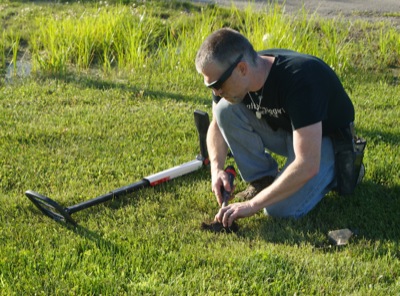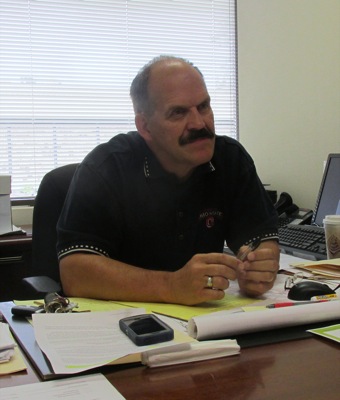Saturday, July 18th, 2015
Vision impairment doesn't deter man's hobby
Local resident uses metal detector to find myriad of lost items
By William Kincaid

Submitted Photo
Metal dectorist Josh Kimmel, of Celina, digs into the ground in search of lost objects and artifacts. Kimmel also hosts an online radio show, "Metal Detecting: Beyond Sight and Sound," at 8 p.m. each Wednesday.
CELINA - For the last 22 years, metal detectorist Josh Kimmel has unearthed objects tossed aside, forgotten or lost, reclaiming the history of local people and culture from more than a century ago to the present day.
"I guess you could say I've always just been fascinated with lost items and items that were in the ground. Even as a kid I was digging up stuff in places," Kimmel told the newspaper.
Kimmel, 40, who is legally blind, has spent incalculable hours metal detecting in public parks, beaches, woods, farm fields, yards and even underwater, not so much in pursuit of a fortune, but a lost story.
He's retrieved countless business tokens (used in lieu of currency), coins and buttons - "they're like snowflakes, everyone is different," he said - and reunited lost class rings and jewelry with their owners.
"When you're able to recover, say, a merchant token that ties to your specific area. Now, that token hasn't been seen possibly in decades and you may have the only one that's even known of, but once you've got that, you're able to save it from the ground, preserve that history, and the story of that item continues," he said.
Some of his more interesting finds are a merchant token "good for 5 cents in trade." The other side of the coin contains the name Joseph Hinders. A man of the same name was Mercer County Sheriff from 1900 to 1907. Kimmel said Hinders also was a carpenter and proprietor of a boarding house and restaurant.
"So this token could quite possibly tie to the restaurant, could tie to his carpentry trade. We may never know," he said.
He also found a local merchant token featuring a swastika - not the emblem of evil but the symbol of good luck used by many cultures before the Nazi Party co-opted it in the '30s.
The expressions that animate an owner's face upon seeing long-lost items such as rings are worth more than anything they offer him, he said.
"They can buy another one but it's not the same. It doesn't have the same meaning as that original ring, whether it's a class ring, whether it's a wedding band, an engagement ring," he said. "You return it to that person, well now it's got all the meaning that it had before and so much more.
"People don't realize the impact that you can have on someone's life just by little gestures like that," he added. "It really does have an impact. I've seen people tear up."
Two separate injuries, both inflicted within the span of about a year, left Kimmel legally blind as a teenager.
"I had sustained an eye injury that actually shattered the lens in my right eye two days before my 16th birthday. It makes you look a little strange and at that point in time, kids can be very cruel," he said. "There was a lot of extreme hazing, bullying, and within a year, I had been attacked and subsequently wound up losing vision in my left eye as well."
His vision will not improve, he said.
"There's no help for me, basically," he added. "My sight isn't going to miraculously come back and it's only going to get worse with age."
Kimmel, who has lived in Celina most of his life, said he "needed a game changer" to allow him to continue his search for arrowheads.
"I couldn't really see it laying on the ground anymore," he said. "I needed something to signal that there was a presence of something and I come to find that there's much more history in the ground that we can't see than what we'll ever be lucky enough to just walk across and spot laying on the ground."
He didn't have much luck with metal detecting at first and abandoned the activity for a few years before trying again with better equipment. Soon he found a gold ring.
"Let's face it, you go out with a metal detector and you dig up a gold ring, you're kind of hooked, especially when you're just getting back into it," he said.
Kimmel was hooked, sometimes spending entire days combing lands for subterranean finds.
"When you turn that machine on you're actually transmitting a signal into the ground and when you come across a metal object, it interrupts or reflects back and that signal is interpreted," he said. "You may get a beep, you may get a tone - depending on what detector you're using - or it may just kind of go silent, but that signals that there is something metal below the search coil."
Kimmel has acquired several detectors but typically uses a Minelab brand that he says is all-terrain, which allows him to use it anywhere.
After much experience, Kimmel has honed his instincts and can often determine if the beeps and tones transmitted to his headset indicate if there's something worth digging for. Unfortunately, bottle caps and pull tabs - the nemesis of metal detectors - litter ground everywhere, he said.
"Nothing's foolproof. I am very handy with tones, though. I've usually got a good indication before I even try to dig," he said.
Kimmel leaves nothing behind. The pull tabs and bottle caps are brought home to his wife, Tambra, for craft projects. Other materials are recycled or properly disposed of. Removing broken glass or sharp projectiles from the ground can prevent someone from hurting themselves, he said.
"It's no big secret: We all dig trash when we're out there," he said. "You may see this guy that posts online that he just dug six silver coins but what you're not seeing is over here the pile of bent nails and bits of wire and stuff like that. We take that stuff home and recycle it. We're pulling bad stuff out of the ground."
A few years ago, Kimmel, a perennial adventurer, decided to start his own online radio program, "
Metal Detecting: Beyond Sight and Sound," which broadcasts live at 8 p.m. every Wednesday.
"We talk about finds, tips, techniques, equipment, experiences," Kimmel said.
Live broadcasts and archived episodes can be accessed at
http://en.1000mikes.com/show/beyond_sight_and_sound.
"My whole time in the hobby I had never mentioned (my vision loss) anywhere really, and thought maybe it's time to let the cat out of the bag, so to speak," he said.
The revelation encouraged others to get involved in metal detecting, he said.
"If I can do it, you can do it," he said. "It's inspiring and motivational for some people, so that prompted me to start the radio show as well as a Facebook group."
People with disabilities - such as one metal detectorist who continued with the hobby even after a bad auto wreck left him with a broken neck, restricted to a wheelchair and only able to use his left arm - can communicate with one another.
"Whether they've got disabilities or whether they don't, they're just as welcome and with knowing different debilitating issues like that, we're able to help these other people who would like to try the hobby but they're just not sure if they can," he said. "We've been able to help people with hearing losses because we know of accessories out there that will help with that."
From his home studio, Kimmel broadcasts the online radio show, which has featured guests such as world famous metal detectorist Chicago Ron, and allows followers to call in or participate in a live chat.
"I'm so used to having headphones on anymore, like right now it almost feels alien to me because I've either got them on detecting or monitoring the show," he said.
He hopes to one day feature fellow metal dectorist Hank Williams Jr. on the show.
"It has a good consistent base of core listeners. I've been very flattered by the amount of support that people have shown for it," he said. "We do try to mix it up from time to time, do a little something different. One week it may be about metal detecting, the next week it may be gold prospecting."
The show has helped Kimmel find new contacts and friends, many from across the globe.
"It's connected a lot of good people, brought a lot of people together," he said.
Kimmel also hosts a YouTube channel called
Ohio Metal Detecting, and a Facebook page entitled
Metal Detecting: Beyond Sight and Sound.
"I like to try to help people out," he said. "I've been contacted before, though, to try to locate rings and property markers. Sometimes you get lucky, sometimes maybe it wasn't lost there to begin with."


